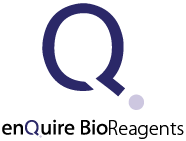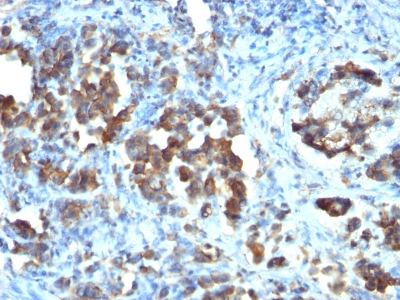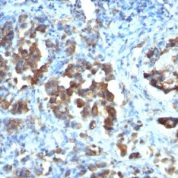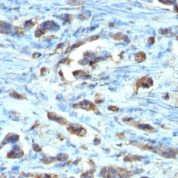Human Anti-Cdc20 Antibody Product Attributes
Species: Human
Tested Applications: Flow Cytometry, Immunofluorescence, Immunohistochemistry (IHC).
Application Notes: Flow Cytometry (0.5-1ug of antibody/million cells in 0.1ml), Immunofluorescence (0.5-1ug of antibody/ml), Immunohistochemistry (IHC) (Formalin-fixed) (2-4ug of antibody/ml for 30 minutes at RT)
Clonality: Monoclonal
Anti-Cdc20 Antibody Clone: CDC20/1102
Clone CDC20/1102 Host and Isotype: Mouse IgG1 kappa
Anti-Human Cdc20 Positive Control Sample: Ramos or HeLa cells. Tonsil or gastric carcinoma.
Cellular Localization of Antibody Cytoplasmic
Buffer and Stabilizer: 10mM PBS with 0.05% BSA & 0.05% azide.
Antibody Concentration: 200ug/ml
Antibody Purification Method:Protein A/G Purified
Immunogen: Recombinant human Cdc20 protein
Storage Conditions: Store at 2 to 8° C (refrigerate). Stable for 24 months when properly stored.
Cdc20 Previously Observed Antibody Staining Patterns
Observed Subcellular, Organelle Specific Staining Data:
Anti-CDC20 antibody staining is expected to be primarily localized to the cytosol and nucleoplasm. There is variability in either the signal strength or the localization of signal in cytosol and nucleoplasm from cell to cell.Observed Antibody Staining Data By Tissue Type:
Variations in Cdc20 antibody staining intensity in immunohistochemistry on tissue sections are present across different anatomical locations. An intense signal was observed in glandular cells in the appendix, small intestine, stomach. More moderate antibody staining intensity was present in glandular cells in the appendix, small intestine, stomach. Low, but measureable presence of Cdc20 could be seen in cells in the tubules in kidney, glandular cells in the breast and salivary gland, non-germinal center cells in the lymph node, respiratory epithelial cells in the nasopharynx and urothelial cells in the urinary bladder. We were unable to detect Cdc20 in other tissues. Disease states, inflammation, and other physiological changes can have a substantial impact on antibody staining patterns. These measurements were all taken in tissues deemed normal or from patients without known disease.Observed Antibody Staining Data By Tissue Disease Status:
Tissues from cancer patients, for instance, have their own distinct pattern of Cdc20 expression as measured by anti-Cdc20 antibody immunohistochemical staining. The average level of expression by tumor is summarized in the table below. The variability row represents patient to patient variability in IHC staining.| Sample Type | breast cancer | carcinoid | cervical cancer | colorectal cancer | endometrial cancer | glioma | head and neck cancer | liver cancer | lung cancer | lymphoma | melanoma | ovarian cancer | pancreatic cancer | prostate cancer | renal cancer | skin cancer | stomach cancer | testicular cancer | thyroid cancer | urothelial cancer |
|---|---|---|---|---|---|---|---|---|---|---|---|---|---|---|---|---|---|---|---|---|
| Signal Intensity | ++ | - | +++ | ++ | ++ | ++ | + | + | ++ | ++ | ++ | ++ | + | ++ | + | ++ | + | ++ | + | ++ |
| CDC20 Variability | + | ++ | ++ | ++ | ++ | ++ | ++ | ++ | ++ | ++ | ++ | ++ | +++ | ++ | ++ | + | +++ | ++ | ++ | ++ |
Limitations and Warranty
enQuire Bio's Cdc20 Anti-Human Monoclonal is available for Research Use Only. This antibody is guaranteed to work for a period of two years when properly stored.






There are no reviews yet.